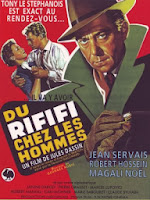
Being the eternal sloth too impatient to stay glued to the tube for long, I never imagined that I’d be writing about a movie someday. Thanks to one of my best friends, Sonja (Sonia Kumar), whose persistent cajoling drew into me the finer aspects of appreciating movies and good stories, and an apparently not-so-significant-to-the-plot moment from the movie that deeply touched my heart, I couldn’t resist writing about
Rififi.
I discovered the movie in a strange way. As is my wont of studying about medicines, I came across
Rifampicin while searching potent antibiotics for my chronic acne breakouts. The pharmacists who discovered this antibiotic in the 1950s were fans of
Rififi, who they named it after. I further dug into it and found an old print of the French movie with English subtitles.
Glad that I discovered the movie, I could write a book on it, but there’s no point in repeating the tons of its critical appreciation. To begin with, you can get a fair idea about the movie on
Wikipedia. Jules Dassin—the director of the movie, who also starred in it as the safe breaker—executed the movie in legendary conditions with a low budget while on the run after getting blacklisted from Hollywood because of some alleged political affiliations (ironic as I thought Hollywood was untouched by petty politics).
Rififi is a classic jewelry heist movie set in Paris, 1955. The brilliance of the plot and its direction lies in the fact that it gets the audience rooting for criminals. Devoid of the typical fanfare of Hollywood movies, the most impactful part of the film is the realism of the heist and its clockwork precision—filmed with no background score or dialogues, briefly rendering it as almost a silent movie. Not only was the movie’s plot of the heist fashioned on a real burglary, it also influenced many a burglar for similar attempts in real life.
The movie excels in portraying the humane aspects of criminals. Behind their tough guise, they are only human with common aspirations for love, wealth and prosperity. That they can be men of character who honor their words, that they can have broken hearts, that they can have loving families for whom they are ready to die for—is all very beautifully depicted in the movie. But most important, the movie depicts how even the perfect heist can get undone by the foibles of humanity.
 |
Louise (Janine Darcey) and Jo (Carl Möhner)
on hearing the news about their kidnapped son
|
I will not be a spoilsport and get into the details of the plot, but here’s what I found to be the defining moment of the movie that compelled me to write this blog. After executing the heist, the protagonists get chased by a rival gang. The rival gang kidnaps the son of one of the protagonists, Jo, as ransom for the spoils of the thievery. Jo had reveled in executing the heist, as if it were a game that he played well and won, but he realized what it meant to steal when his son got stolen from him.
The mastermind of the heist, Tony, is the godfather of Jo’s son. He promises to get Jo’s son back. Worriedly awaiting Tony’s phone call about their son, Jo and his wife (Louise) exchange dialogues where Louise blames Jo for their predicament. Louise says to Jo:
- That his tough demeanor of a gangster was just a guise—a pretense of his underlying weakness.
- That his friends from his earlier days of poverty were stronger. They were stronger as they could resist giving into their temptations (of committing a crime).
So true! You may have ruled the world, but it all comes to naught if you can’t rule your mind. Controlling the inner demons is the biggest feat. Giving into temptations is the easiest thing one can do. Many a time, we give into temptations and make rash impulsive decisions only to repent later. This insightful dialogue from Louise may not appear to be significant to the overall plot of the movie’s heist theme, but I reckon it to be the most profound truth
Rififi brought to the fore using crime as a metaphor.
Lately, I had been thinking of buying an expensive motorcycle at the cost of ignoring some important financial needs of my family. Having deferred the biking plans, I’m sure my future ride will be sweeter—for I have controlled my inner Rififi.
Sigh! :-( The Tiger Explorer will have to wait. - Faezal






